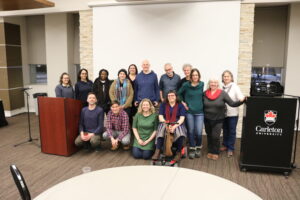Why Study With Us?
Know Your World
The Department of Sociology and Anthropology offers students a community of supportive peers, opportunities for community engagement and experiential learning, and a variety of events, courses, and program elements designed to help students determine how best to apply their degrees in search for employment or further studies.
Our department is one of the largest and most prestigious of its kind in Canada, and our alumni can be found in all sectors of society, from government and developmental work, to arts and media.
The Department of Sociology and Anthropology is an outstanding community of scholars, activists and professionals who support one another. I was able to join this network of leaders and access the training, opportunities and resources needed for my intellectual and professional development. I won awards, conducted international field research, and published my research thanks to the guidance and support of faculty, staff, and colleagues in this program.
Victoria Simmons (PhD Sociology, 2019)
University Lecturer at Mount Royal University
The Capital Advantage
We would like to acknowledge that the Department of Sociology and Anthropology is located on the traditional and unceded territory of the Omamiwininiwag, the Anishinabe Algonquin Nation. We make this acknowledgement to remind ourselves that the Omamiwininiwag remain the guardians and caretakers of this land, and that those of us who are settlers are their guests, and hence we have a duty to honour and uphold the land itself and the sovereign Indigenous rights on unceded, unsurrendered Anishinabe territory.
The Two Disciplines
Photo credit: Gaya Kitnasamy’s ‘Heartberry Phases’ (first place in the 2022 SocAnth art contest)
Our department is home to two disciplines, anthropology and sociology. While there are identifiable differences in approach and style of research, we prefer to stress the complementarity of our respective projects. Many of our faculty work in interdisciplinary fields straddling, or crossing the lines between sociology and anthropology, and inner-departmental collaborations in research and supervision of students are common.
Our students benefit from the synergetic effects produced by our two disciplines. On the BA level, many program requirements can be fulfilled through either sociology or anthropology courses. This enlarges the range of choices and allows students to tailor their studies to their individual needs and interests. Our MA and PhD students are offered the opportunity to choose their advisory committees from both sides of the disciplinary fence, and often make use of it. The number of our faculty and the diversity of their interests allow us to cover a wide range of topical fields, theoretical approaches and geographic regions.

View Current Course Offerings

Meet our Faculty, Contract Instructors, and Affiliated Scholars

Watch Videos of Past Event, Projects, and Celebrations
We are also able to make use of our interdisciplinary approach to create student placements and internships with government departments such as Statistics Canada, Justice Canada, Human Resources and Skills Development Canada and Health Canada among others, as well as with non-governmental organizations.
Co-Op
Find out more about co-op in our undergraduate and graduate programs
Practicum/Placements
Learn more about undergraduate and graduate practicum/placement opportunities
Careers
Discover what alumni are up to and read what some of them had to say about the department
Our programs are committed to social justice, critical thinking, and rigorous research and teaching. We help students develop skills for addressing social issues across a range of contexts. Research and courses within the department touch on citizenship, globalization, migration, cultural studies, gender and feminist theories, criminology, social movements, youth cultures, race and racialization, childhood studies, political economy, education, symbolism, rituals, colonialism, health, labour, development, Indigenous issues, environment, and language, to name only a few.